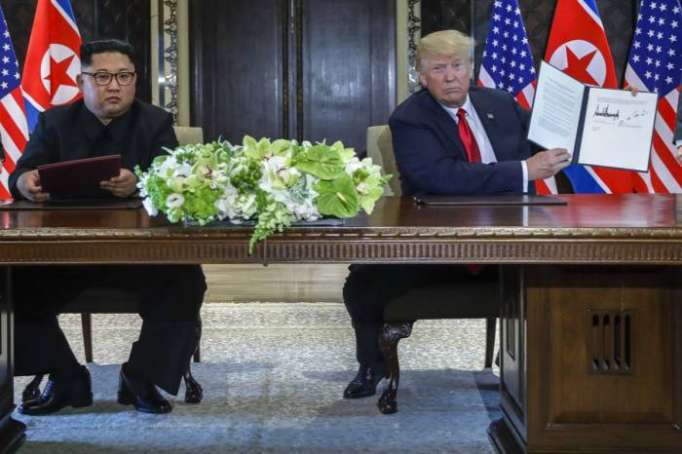The document, which Trump deemed "very comprehensive," says the two sides commit to hold follow-up negotiations and to cooperate to develop bilateral relations.
Asked about what the agreement meant for North Korea's denuclearization, Trump said "we're starting that process very quickly — very, very quickly."
A photo of the document Trump signed revealed that the leaders agreed on these four points:
1. The United States and the DPRK commit to establish new U.S.-DPRK relations in accordance with the desire of the peoples of the two countries for peace and prosperity.
2. The United States and the DPRK will join their efforts to build a lasting and stable peace regime on the Korean Peninsula.
3. Reaffirming the April 27, 2018 Panmunjom Declaration, the DPRK commits to work toward complete denuclearization of the Korean Peninsula.
4. The United States and the DPRK commit to recovering POW/MIA remains, including the immediate repatriation of those already identified.
In addition to those elements, the document says Trump "committed to provide security guarantees" to North Korea, an apparent reference to the authoritarian government's longstanding concern that the ultimate American goal is regime change in Pyongyang.
"I think our whole relationship with North Korea and the Korean Peninsula is going to be a very much different situation than it has in the past. We both want to do something, we both are going to do something, and we have developed a very special bond," Trump said at the signing ceremony. "This is going to lead to more and more and more."
Many experts expressed dismay at the agreement, however. For one, Beatrice Fihn, executive director at the International Campaign to Abolish Nuclear Weapons — a civil society coalition that was awarded the 2017 Nobel Peace Prize — said on Twitter the agreement is flawed because Kim did not explicitly agree to nuclear disarmament.
"[T]his all looked more like a big welcome party to the nuclear-armed club," she said.
Vipin Narang, an MIT expert focusing on nuclear proliferation and strategy, said on Twitter that the U.S. guarantee of security and North Korea's pledge to work toward denuclearization were "a vague meaningless pledge in exchange for a vague meaningless guarantee."
China, North Korea's longtime patron, took a decidedly positive tone on the agreement. The fact that both leaders can sit together and converse has significant meaning and creates new history, Chinese Foreign Minister Wang Yi told reporters, according to Chinese news media.
'Very worthy, very smart'
After the signing of the document, Trump declared to the assembled media at the summit that Kim was a "very worthy, very smart negotiator."
"We had a terrific day and we learned a lot about each other and about our countries," Trump said, standing shoulder-to-shoulder with the North Korean dictator. "I learned he's a very talented man. I also learned he loves his country very much."
That comment from Trump elicited a question during his post-summit press conference.
"He is very talented: Anybody that takes over a situation like he did at 26 years of age and is able to run it and run it tough — I don't say he was nice," the president said.
The summit began with the two men briefly shaking hands and taking a photo side-by-side, then moving to another room, where they sat and made brief statements for the press.
"We're going to have a great discussion and, I think, tremendous success. It will be tremendously successful. And it's my honor," Trump said.
"We will have a terrific relationship — I have no doubt," the president added.
For his part, the North Korean leader said, "It was not easy to get here. The past worked as fetters on our limbs, and the old prejudices and practices worked as obstacles on our way forward. But we overcame all of them, and we are here today," according to a translation provided by the White House.
Trump responded: "That's true."
Following those comments, the two leaders began what was said to be a one-on-one meeting, with only translators in attendance.
They then made a brief appearance together at a balcony exposed to cameras, and then headed into a larger bilateral meeting. With delegation members on opposing sides of the table, Trump delivered another message to Kim.
"Mr. Chairman, it's a great honor to be with you, and I know we'll have tremendous success together and we'll solve a big problem — a big dilemma — that until this point has been unable to be solved, and working together we'll get it taken care of," Trump said before reaching for another handshake with his North Korean counterpart.
After hearing Kim's response, Trump added: "We will solve it, we will be successful, and I look forward to working on it with you. It will be done."
Later in the day, the two men walked out of the meeting together, and Trump addressed the media.
"It's going great. We had a really fantastic meeting, a lot of progress, really very positive. I think better than anybody could have expected — top of the line, really good," the president said.
First such meeting in history
It was the first time that sitting leaders of the countries have met, and it came after years of bluster and threats from Pyongyang — and from Trump — that have raised fears of war.
Of note, many analysts have argued that any recent U.S. leader who had wanted to meet with Kim or his father before him could have done so, because North Korea sought the legitimization of such an event.
Trump gave Kim's regime that opportunity, but the U.S. team also said it is resolute in its goal for Tuesday's summit: North Korea's total and verifiable denuclearization.
American officials have dangled relief from stringent international sanctions or even economic aid if the hermit regime were to acquiesce. Beyond those benefits, North Korea was understood to want guarantees about the future of its autocratic regime and the security of its borders.
CNBC
More about: Trump KimJong-un
















































